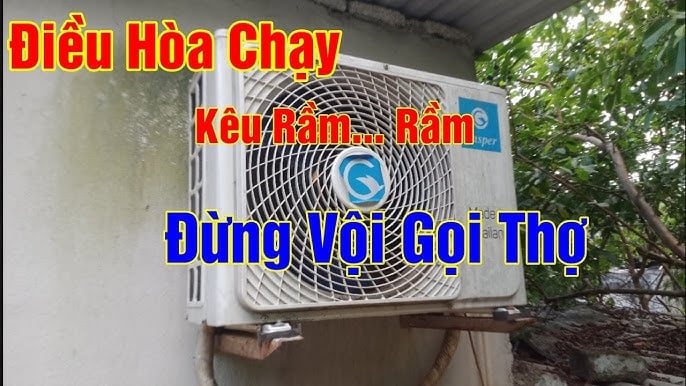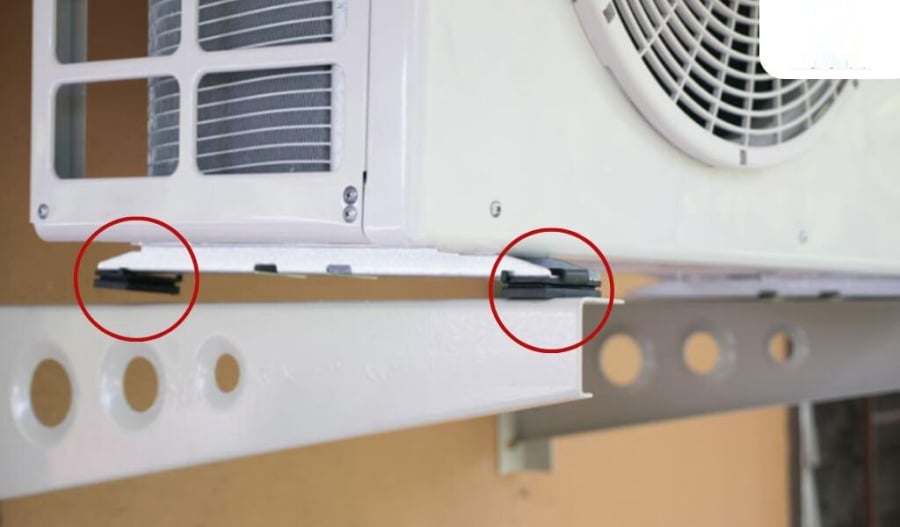Common Causes of Loud Noises from the Outdoor AC Unit
The outdoor unit is the most critical component of your air conditioning system, responsible for heat exchange to cool your room. When it starts making abnormal loud noises, it could be due to several reasons:
-
Loose screws: Over time, the vibration from prolonged operation can cause the screws holding the casing, frame, or fan to become loose, resulting in loud noises.
-
Bent or dusty condenser fins: When dust, dirt, or debris accumulate on the condenser fins, or if there are obstructions, the passing air creates an annoying buzzing or humming sound.
-
Misaligned or dry outdoor fan: A squealing noise similar to a blender is produced when the outdoor fan blades rotate unevenly or the shaft dries out.
-
Improper unit placement: If the outdoor unit is mounted on a loose wall bracket or an unstable base, the strong vibrations will result in loud noises resembling those of heavy machinery.

A Simple Fix to Make Your AC Run Smoothly Again: Tighten the Screws
Golden Tip Summary: Outdoor AC unit loudness is mostly due to loose screws – tightening the screws at the fixing points with a screwdriver will make the unit as quiet as it was originally, without the need for a technician.
It’s a simple process that only takes 5 to 10 minutes:
Step 1: Turn Off the Power Supply to Your AC Completely
Ensure absolute safety before proceeding.
Step 2: Inspect the Screw Fixings
Use a screwdriver to check all the screws in the following locations:
-
Outer protective casing
-
Wall-mounted or freestanding frame
-
Outdoor fan fixing position
Step 3: Tighten Loose Screws
Over time and with vibration, these screws can work themselves loose. Tightening them will secure the outdoor unit, reducing strong vibrations and immediately reducing noise.
Step 4: Lightly Clean the Area Around the Fan and Condenser Fins
Use a soft brush or a handheld vacuum cleaner to gently remove dust and cobwebs from the inside.
Bonus Tip: Use Anti-Vibration Rubber Pads
If your outdoor unit is placed on a concrete base, consider adding thin rubber pads or anti-vibration mats underneath to isolate vibrations when the unit is running at high power, significantly reducing noise.

When to Call a Technician
If, after tightening the screws and cleaning the unit, it still makes loud noises, you should contact a technician as there may be more serious issues, such as:
-
Damaged fan motor bearings
-
Broken fan blades or a misaligned shaft
-
Malfunctioning compressor
A loud outdoor AC unit doesn’t always indicate a serious malfunction. Simple fixes like tightening screws can make your AC run more quietly, saving you from costly technician visits. Regularly inspect and tighten screws every 3 to 6 months to ensure your AC operates smoothly, efficiently, and lasts longer.
Do I Really Need a Washing Machine Stand? You’ll Regret Not Knowing This.
The washing machine stand is designed with a sturdy square or rectangular shape and features four legs and a surrounding frame. It provides a stable and secure base for your washing machine, ensuring it stays firmly in place during operation. With its practical design, this stand not only enhances the stability of your appliance but also elevates it to a comfortable height, making loading and unloading laundry a breeze. Crafted from high-quality materials, this stand is built to last and can withstand the weight and vibrations of your washing machine with ease.
Buying a Washing Machine Stand: What to Look for
Do you want to get the most out of your washing machine? Then a washing machine stand is the perfect addition to your home. These stands offer numerous benefits, such as convenience, safety, and cost-effectiveness. But how do you know which washing machine stands are right for you? Read on to find out!


































